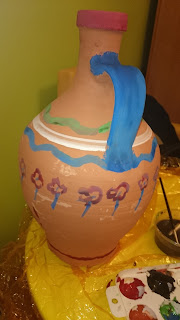The nature of the disorder alone makes it challenging to approach individuals with dementia, especially of the Alzheimer's type, which is the most common one. These people are quite often placed in care units, because from a point on, they can not take care of themselves, and with noone around all day, they live at risk of an accident.
Yet even upon being placed in a formal clinical setting, how can help be provided to them?
Research indicates what is nothing more than rational: they need some kind of cognitive excersise, an opportunity to remain mentally active in order to delay the progression of the rapid and consuming disorder. Activities conducted in a group setting (for practical and behavioral reasons) may range from memory therapy and (board) games and verbal excersises to practicing a skill (such as drawing). Thus what these people need are constant reminders, and continouus mental action.
A nice combination of both can occur during festive eras, such as Christmas, Easter, national holidays, even birthdays, with relevant activities. This combines reminiscence therapy, with a more firm orientation in time and place, as well as with a practice of an old skill. Still, this also combines difficulty with fun: the activities must be at a level challenging for the residents of the unit, but at the same time easy enough to remember, conduct and enjoy.

One of the most popular festive eras in Greece is Easter, a time of religious and social importance, especially for the elderly who have more old- fashioned beliefs. During this time, it is a custom to dye eggs with a red colour. This is usually done in the morning of Thursday before Easter, and it is a quite easy process: the eggs are boiled, and when they are ready and cooled, they are placed in a pot with a mix of water and a (ready- made) dye, and then each egg is carefully placed inside and removed only a few minutes later, new and colourfoul. This is related to another custom, where in the big Easter table each takes an egg, and smashes it with someone else's wishing 'Happy Easter'; the winner is the one whose egg won't break despite all the crashing.
This custom is embedded in the culture, and is something every housewife had been doing in the past. Since this is also a relatively easy activity in terms of physical capabilities, a chance is provided to remember, re- do, react to the happening of the environment outside the unit.
And in fact, elderly with dementia love this activity! Since it is something they used to do they feel capable and their self- esteem could be increased, while at the same time they experience a pleasurable task that connects them with each other.
On top of that, it is a task easy for the therapists as well: the eggs are presented already boiled, and all the residents have to do is to place them slowly (with hands wearing gloves) inside the pot with the water and the dye, and remove them even more slowly (with a spoon usually to maintain the colour).
Other similar activities may be created based on customs of each country or area. For example in some islands in Greece people tend to throw ceramic jars out of the windows all together at the same time on Easter day, which makes a nice and fun event. In terms of activities, residents of care units could dye their own pitchers before hand and throw them down the windows on the special day.

This is a task as simple as it may seem: the residents are presented with the jars and water colours, and they create motifs on them, anything they like. The fact that this is done purposefully to be used adds motivation.
In general, those are fun and easy activities that add a sense of orientation and promote communication. Do those of your own culture, or use those of others- something which may add more curiocity and interest.
Literature: N. Tsergas, 2014. Therapeutic Approaches through Art, Athens, Topos; J. Creek, L. Lougher, 2008. Occupational Therapy and Mental Health, Athens, BHTA Medical Publications MEPE; A. Xristopoulou, 2008. Introdution to the Adult Psychopathology, Athens, Topos; D. R. Addis, S., C., Prebble, L., J., Tippett, 2013. Autobiographical Memory and Sense of Self. Psychological Bulletin, 139, 4; P., B., Harris, J., Keady, 2009. Selfhood in Younger Onset Dementia: Transitions and Testimonies. Aging & Mental Health, 13, 3.
NOTE: Activities analyzed along with the photographs are taken within the group therapies of an elderly care unit in Athens, Greece.


Δεν υπάρχουν σχόλια:
Δημοσίευση σχολίου